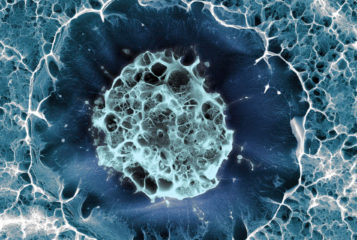A naturally occurring protein can activate stem cells in mouse hearts, producing new muscle cells to replace the tissue damaged by a heart attack, UK scientists have found. The discovery offers hope that a similar drug, which could stimulate the human heart to repair itself, could one day be developed.
The team, led by Professor Paul Riley at University College London's Institute of Child Health, showed that a small protein called thymosin beta 4 (Tß4) was able to 'prime' the heart for repair if given to mice every day for a week before a heart attack.
In the Tß4-treated animals they found that, after the attack, a group of inactive stem cells in the outer layer of the heart were 'woken up', moved inwards to the site of injury, and gave rise to new heart muscle cells. They also observed thickening of the heart walls, a reduction in scar tissue, and a 25 percent increase in the ability of the heart to pump out blood.
Speaking to the Daily Telegraph, Professor Riley explained that the new muscle cells 'link in with themselves and also with the existing heart muscle which has survived the injury, and therefore they can contribute both structurally and functionally to the repair of the damaged muscle'.
The injury caused by a heart attack was previously thought to be irreversible, but the new research highlights the possibility of a preventative treatment for people with a high risk of heart disease. Professor Riley said: 'I could envisage a patient known to be at risk of a heart attack - either because of family history or warning signs spotted by their GP - taking an oral tablet, which would prime their heart so that if they had a heart attack the damage could be repaired'.
The British Heart Foundation, which funded the study, described repairing a damaged heart as the 'holy grail' of heart research, but warned that a human treatment was still years away. However, medical director Peter Weissberg praised the findings. 'The really exciting thing about this is that we have the cells sitting in and around our hearts, lying dormant, but with the capacity to repair the heart if only they get the right molecular switches', he said.
Although advances in treatment for heart disease have led to improved survival rates, around 750,000 people in the UK alone still live with the debilitating consequences of the condition.
The study was published in the journal Nature.






Leave a Reply
You must be logged in to post a comment.